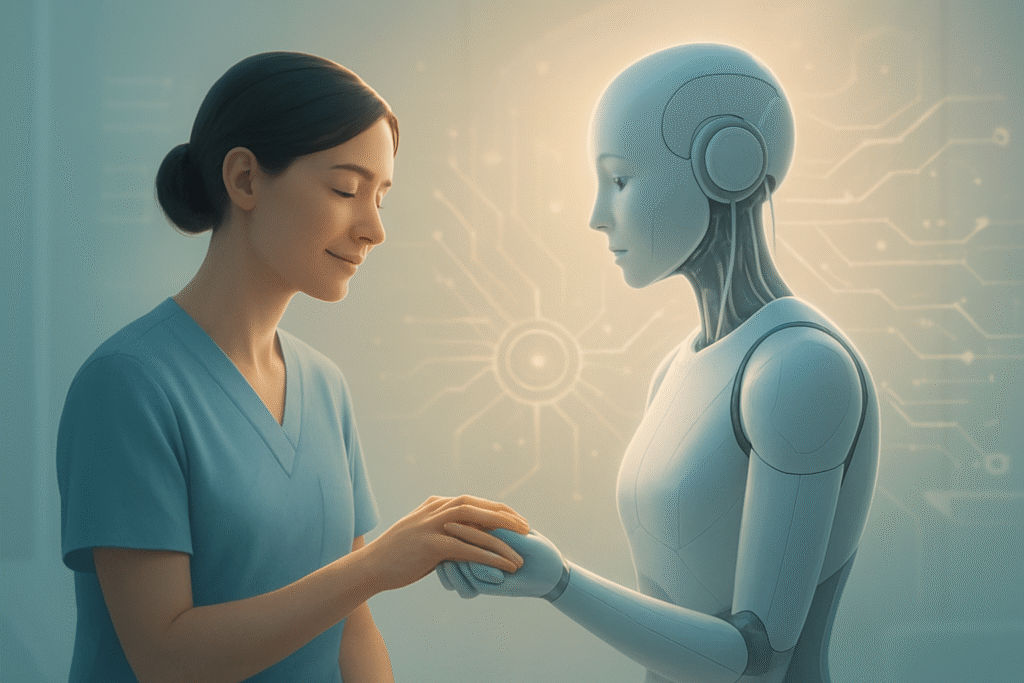
Vatican City – In a powerful and timely intervention, Pope Leo XIV has issued a fervent call for the ethical integration of Artificial Intelligence (AI) into healthcare systems, placing human dignity and moral considerations at the absolute forefront. Speaking to the International Congress "AI and Medicine: The Challenge of Human Dignity" in Vatican City this November, the Pontiff underscored that while AI offers transformative potential, its deployment in medicine must be rigorously guided by principles that uphold the sanctity of human life and the fundamental relational aspect of care. This pronouncement solidifies the Vatican's role as a leading ethical voice in the rapidly evolving AI landscape, urging a global dialogue to ensure technology serves humanity's highest values.
The Pope's message, delivered on November 7, 2025, resonated deeply with the congress attendees, a diverse group of scientists, ethicists, healthcare professionals, and religious leaders. His address highlighted the immediate significance of ensuring that technological advancements enhance, rather than diminish, the human experience in healthcare. Coming at a time when AI is increasingly being deployed in diagnostics, treatment planning, and patient management, the Vatican's emphasis on moral guardrails serves as a critical reminder that innovation must be tethered to profound ethical reflection.
Upholding Human Dignity: The Vatican's Blueprint for Ethical AI in Medicine
Pope Leo XIV's vision for AI in healthcare is rooted in the unwavering conviction that human dignity must be the "resolute priority," never to be compromised for the sake of efficiency or technological advancement. He reiterated core Catholic doctrine, asserting that every human being possesses "ontological dignity… simply because he or she exists and is willed, created, and loved by God." This foundational principle dictates that AI must always remain a tool to assist human beings in their vocation, freedom, and responsibility, explicitly rejecting any notion of AI replacing human intelligence or the indispensable human touch in medical care.
Crucially, the Pope stressed that the weighty responsibility of patient treatment decisions must unequivocally remain with human professionals, never to be delegated to algorithms. He warned against the dehumanizing potential of over-reliance on machines, cautioning that interacting with AI "as if they were interlocutors" could lead to "losing sight of the faces of the people around us" and "forgetting how to recognize and cherish all that is truly human." Instead, AI should enhance interpersonal relationships and the quality of care, fostering the vital bond between patient and carer rather than eroding it. This perspective starkly contrasts with purely technologically driven approaches that might prioritize algorithmic precision or data-driven efficiency above all else.
These recent statements build upon a robust foundation of Vatican engagement with AI ethics. The "Rome Call for AI Ethics," spearheaded by the Pontifical Academy for Life in February 2020, established six core "algor-ethical" principles: Transparency, Inclusion, Responsibility, Impartiality, Reliability, and Security and Privacy. This framework, signed by major tech players like Microsoft (NASDAQ: MSFT) and IBM (NYSE: IBM), positioned the Vatican as a proactive leader in shaping ethical AI. Furthermore, a "Note on the Relationship Between Artificial Intelligence and Human Intelligence," approved by Pope Francis in January 2025, provided extensive ethical guidelines, warning against AI replacing human intelligence and rejecting the use of AI to determine treatment based on economic metrics, thereby preventing a "medicine for the rich" model. Pope Leo XIV's current address reinforces these principles, urging governments and businesses to ensure transparency, accountability, and equity in AI deployment, guarding against algorithmic bias and the exacerbation of healthcare inequalities.
Navigating the Corporate Landscape: Implications for AI Companies and Tech Giants
The Vatican's emphatic call for ethical, human-centered AI in healthcare carries significant implications for AI companies, tech giants, and startups operating in this burgeoning sector. Companies that prioritize ethical design, transparency, and human oversight in their AI solutions stand to gain substantial competitive advantages. Those developing AI tools that genuinely augment human capabilities, enhance patient-provider relationships, and ensure equitable access to care will likely find favor with healthcare systems increasingly sensitive to moral considerations and public trust.
Major AI labs and tech companies, including Google (NASDAQ: GOOGL), Amazon (NASDAQ: AMZN), and Apple (NASDAQ: AAPL), which are heavily invested in healthcare AI, will need to carefully scrutinize their development pipelines. The Pope's statements implicitly challenge the notion of AI as a purely efficiency-driven tool, pushing for a paradigm where ethical frameworks are embedded from conception. This could disrupt existing products or services that prioritize data-driven decision-making without sufficient human oversight or that risk exacerbating inequalities. Companies that can demonstrate robust ethical governance, address algorithmic bias, and ensure human accountability in their AI systems will be better positioned in a market that is increasingly demanding responsible innovation.
Startups focused on niche ethical AI solutions, such as explainable AI (XAI) for medical diagnostics, privacy-preserving machine learning, or AI tools designed specifically to support human empathy and relational care, could see a surge in demand. The Vatican's stance encourages a market shift towards solutions that align with these moral imperatives, potentially fostering a new wave of innovation centered on human flourishing rather than mere technological advancement. Companies that can credibly demonstrate their commitment to these principles, perhaps through certifications or partnerships with ethical review boards, will likely gain a strategic edge and build greater trust among healthcare providers and the public.
The Broader AI Landscape: A Moral Compass for Innovation
The Pope's call for ethical AI in healthcare is not an isolated event but fits squarely within a broader, accelerating trend towards responsible AI development globally. As AI systems become more powerful and pervasive, concerns about bias, fairness, transparency, and accountability have moved from academic discussions to mainstream policy debates. The Vatican's intervention serves as a powerful moral compass, reminding the tech industry and policymakers that technological progress must always serve the common good and uphold fundamental human rights.
This emphasis on human dignity and the relational aspect of care highlights potential concerns that are often overlooked in the pursuit of technological advancement. The warning against a "medicine for the rich" model, where advanced AI-driven healthcare might only be accessible to a privileged few, underscores the urgent need for equitable deployment strategies. Similarly, the caution against the anthropomorphization of AI and the erosion of human empathy in care delivery addresses a core fear that technology could inadvertently diminish our humanity. This intervention stands as a significant milestone, comparable to earlier calls for ethical guidelines in genetic engineering or nuclear technology, marking a moment where a powerful moral authority weighs in on the direction of a transformative technology.
The Vatican's consistent advocacy for "algor-ethics" and its rejection of purely utilitarian approaches to AI provide a crucial counter-narrative to the prevailing techno-optimism. It forces a re-evaluation of what constitutes "progress" in AI, shifting the focus from mere capability to ethical impact. This aligns with a growing movement among AI researchers and ethicists who advocate for "value-aligned AI" and "human-in-the-loop" systems. The Pope's message reinforces the idea that true innovation must be measured not just by its technical prowess but by its ability to foster a more just, humane, and dignified society.
The Path Forward: Challenges and Future Developments in Ethical AI
Looking ahead, the Vatican's pronouncements are expected to catalyze several near-term and long-term developments in the ethical AI landscape for healthcare. In the short term, we may see increased scrutiny from regulatory bodies and healthcare organizations on the ethical frameworks governing AI deployment. This could lead to the development of new industry standards, certification processes, and ethical review boards specifically designed to assess AI systems against principles of human dignity, transparency, and equity. Healthcare providers, particularly those with faith-based affiliations, are likely to prioritize AI solutions that explicitly align with these ethical guidelines.
In the long term, experts predict a growing emphasis on interdisciplinary collaboration, bringing together AI developers, ethicists, theologians, healthcare professionals, and policymakers to co-create AI systems that are inherently ethical by design. Challenges that need to be addressed include the development of robust methodologies for detecting and mitigating algorithmic bias, ensuring data privacy and security in complex AI ecosystems, and establishing clear lines of accountability when AI systems are involved in critical medical decisions. The ongoing debate around the legal and ethical status of AI-driven recommendations, especially in life-or-death scenarios, will also intensify.
Potential applications on the horizon include AI systems designed to enhance clinician empathy by providing comprehensive patient context, tools that democratize access to advanced diagnostics in underserved regions, and AI-powered platforms that facilitate shared decision-making between patients and providers. Experts predict that the future of healthcare AI will not be about replacing humans but empowering them, with a strong focus on "explainable AI" that can justify its recommendations in clear, understandable terms. The Vatican's call ensures that this future will be shaped not just by technological possibility, but by a profound commitment to human values.
A Defining Moment for AI Ethics in Healthcare
Pope Leo XIV's impassioned call for an ethical approach to AI in healthcare marks a defining moment in the ongoing global conversation about artificial intelligence. His message serves as a comprehensive wrap-up of critical ethical considerations, reaffirming that human dignity, the relational aspect of care, and the common good must be the bedrock upon which all AI innovation in medicine is built. It’s an assessment of profound significance, cementing the Vatican's role as a moral leader guiding the trajectory of one of humanity's most transformative technologies.
The key takeaways are clear: AI in healthcare must remain a tool, not a master; human decision-making and empathy are irreplaceable; and equity, transparency, and accountability are non-negotiable. This development will undoubtedly shape the long-term impact of AI on society, pushing the industry towards more responsible and humane applications. In the coming weeks and months, watch for heightened discussions among policymakers, tech companies, and healthcare institutions regarding ethical guidelines, regulatory frameworks, and the practical implementation of human-centered AI design principles. The challenge now lies in translating these moral imperatives into actionable strategies that ensure AI truly serves all of humanity.
This content is intended for informational purposes only and represents analysis of current AI developments.
TokenRing AI delivers enterprise-grade solutions for multi-agent AI workflow orchestration, AI-powered development tools, and seamless remote collaboration platforms.
For more information, visit https://www.tokenring.ai/.





